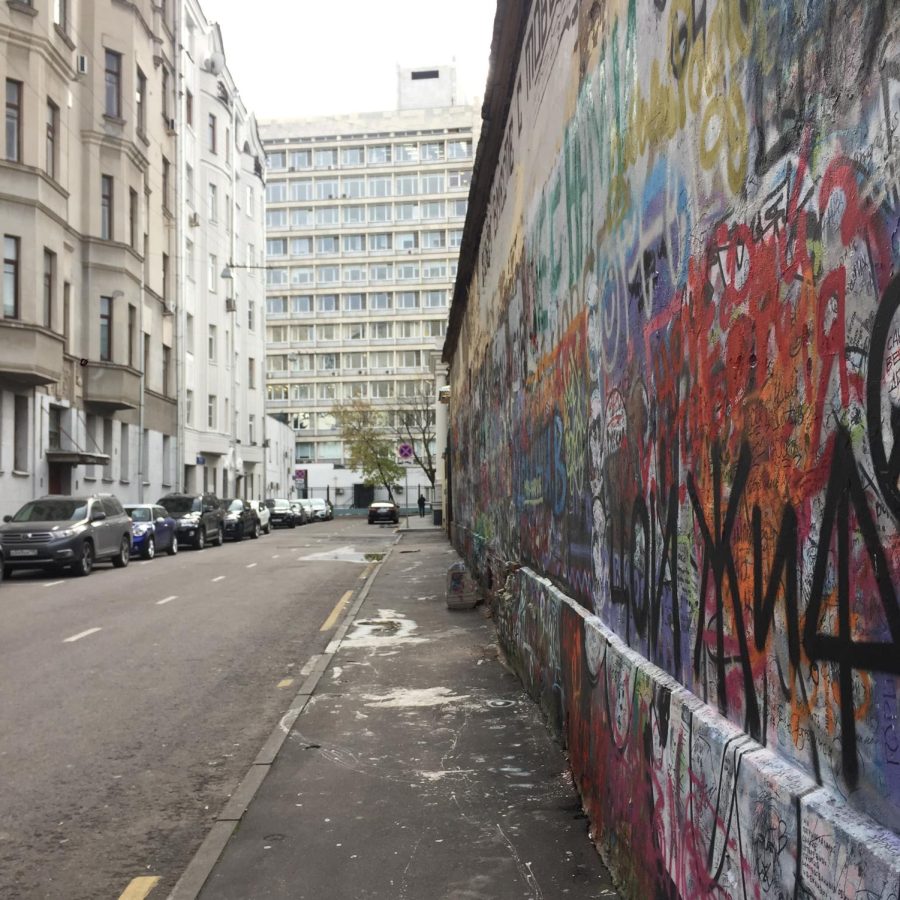Russian-American, WVHS student describes living with a hyphen as Russia-Ukraine war approaches one-year mark
“Tsoi is alive.” In Moscow, there is a graffiti covered wall dedicated to Viktor Tsoi, a Russian musician, and his band Kino. The site is regarded as a tourist attraction, yet at its heart the ever-changing mural represents youth rebellion and even freedom, according to an article published by Sarah Parker on Museum Studies Abroad. Photo provided by Alexi.
Nestled on the outermost ring of Moscow is a school. A school where teachers tell boys not to play with toy guns, lest they grow up to believe violence to be normal. A school where young Alexi sat amongst his classmates, learning about such things as peace, war, and arithmetic.
Alexi (name changed for anonymity) grew up in Moscow–“Russia, not Idaho”–until his family moved to California in 2018, and then to Oregon in 2019.
Since relocating to Oregon, Alexi and his family have become regulars at a small grocery store in Southeast Portland called Overseas Taste, until it was recently renamed Bucha Shop in reference to the Bucha massacre of March 2022. Bucha, a city in Ukraine, was occupied by Russian forces for nearly a month after the February 24th invasion that incited the friction into a red-hot fire: “When Ukrainian forces came [back into Bucha], there were bodies found in the streets, it was almost nearly decimated to the ground. They’re still burying them.” Bucha Shop is just one example of how the Portland community of Russian speakers–that are predominantly Ukrainian–is showing their support.
According to Alexi, many members of the Portland community are making the switch to speaking only Ukrainian. With access to global news and social media, something as quiet as spoken language can be influenced, even when the influencing force is a war on the opposite side of the world.
During the interview Alexi referenced The Black Swan, by Nassim Taleb, which focuses on unpredictable events with extensive ramifications. For Alexi, the Russian invasion on February 24th was just that: “The world as it was in January of last year won’t exist again.”
Three-hundred and thirty-seven days ago, Russia invaded Ukraine, an escalation that transformed an eight-year conflict into a war. Eleven months and three days ago, one Wilsonville High School student’s world irrevocably changed.
On the morning of February 24th and for what would be weeks–even months–to come, the conflict was at the tips of tongues, the top of major newspapers, and displayed across news broadcasts at regular intervals. Alexi recalled feeling “pretty emotional” and “preoccupied” during the days directly following the invasion: “Wars don’t start everyday.”
During one of his classes on the 24th–“ironically in a social studies class”–he remembers a group of students coming in the door, while one responded to the group, “‘If it was up to me I would bomb all of Russia.’”
Alexi is not physically affected by the war like his family in Moscow, or the Ukrainians and other Eastern Europeans living in war-torn regions. There are 5376 miles between his life and theirs, causing him to feel only certain diffused effects of it. Yet emotionally, a part of him is still in Moscow. “It’s a very weird mix of feelings,” he said.
“What you have to understand is that personally, I am extremely proud to be Russian. I’m proud of my heritage. I’m proud…but I do think there is a very distinct difference between liking being Russian and liking the government.”
In Russia, as Alexi explained, political views tend to lean one of two ways. The first is pro-government; the second, anti-government. Alexi finds himself increasingly attuned with the latter’s stance, as he explained, “The government lives a life of its own,” and the government is in no way “conducive to a stable existence of the people.”
The anti-war ideologies Alexi’s teachers emphasized while in Moscow juxtaposed with Russia’s recent aggression towards Ukraine is something he is still wrapping his head around. On the precipice of the February 24th escalation, Alexi vividly remembers watching a video published by a decorated Russian political scientist and professor named Ekaterina Schulmann that unfalteringly denied any potential for war with Ukraine.
Now, on January 27th of 2023, the Russian-Ukraine war is twenty-eight days away from its one-year anniversary. Whether he visits Overseas Taste or Bucha Shop, Alexi is still defining what it means to be a Russian living in Wilsonville, Oregon.









